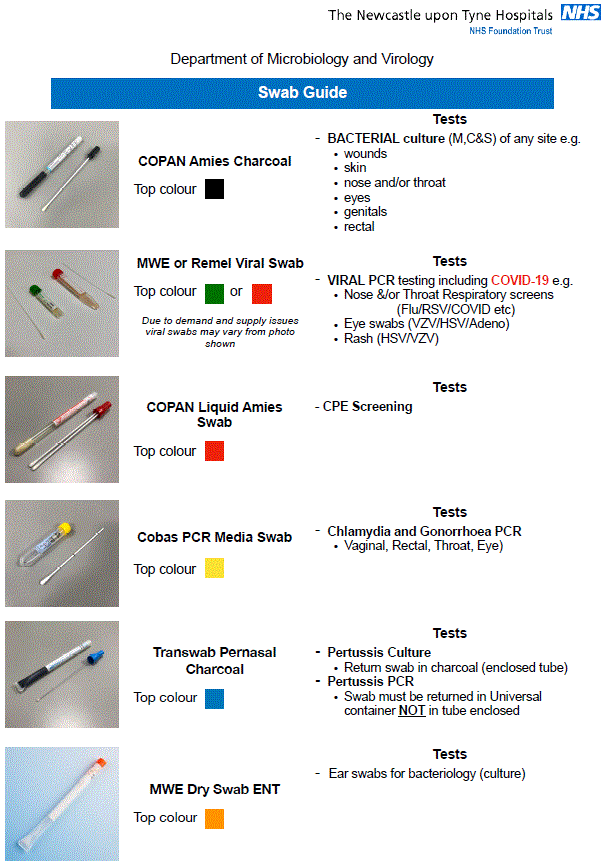Specimen Submission
Transport of specimens:
GP Samples
Samples are collected regularly from the GP surgeries by the Integrated Laboratory Medicine courier service and taken to the Freeman Hospital Integrated Laboratory Medicine Reception.
Newcastle Hospitals Specimens
Freeman Hospital – Routine samples should be delivered to Integrated Laboratory Medicine reception at all times.
Royal Victoria Infirmary – Routine samples should be delivered to the Microbiology & Virology department reception at all times. This is done via Blood Sciences Reception where a courier will transport samples to the Freeman Hospital.
NB: Urgent hospital samples including on-call requests must be sent to Freeman Hospital Main Reception via urgent courier. This is arranged by Leazes Wing and New Victoria Wing Reception staff. For out of hours samples, these must be taken to these referral points as soon as possible after contacting the on-call Biomedical Scientist.
Specimens from external NHS Trusts and other organisations
Samples from external service users can be delivered in person either to Freeman Hospital or RVI (as above) or sent by Royal Mail or courier service.
Alternatively, Hays DX can be used to transport specimens. Our address is:
Microbiology FRH
DX6361207, Newcastle
Newcastle 95NE
High Risk Samples
The Laboratory must be made aware when a specimen is high risk by labelling both the request form, where submitted, and sample container with a biohazard label.
It is not necessary for safety reasons to identify the patient’s condition on the request form, although it will aid diagnosis, except in the case of known or suspected Transmissible Spongiform Encephalopathy (TSE, e.g. CJD/vCJD).
Note that infectious specimens are safe to be transported by Hopper, courier or taxi when correctly packed in the UN approved triple packaging, as for other diagnostic specimens, but in this instance the outer pack must display a UN2814 ‘Infectious Substance’ biohazard label (often pre-printed on the outer box).
All samples must be transported in compliance with the National Road Transport policy for the ‘Transport of clinical specimens’.
Any queries about specimen transport can be addressed to Integrated Laboratory Medicine Business Unit (Tel: 0191 223 1135)
Acceptance and Rejection of specimens
The complete Sample Acceptance and Rejection Policy for Newcastle Hospitals Trust can be viewed here (click here).
Samples must be labelled promptly in close vicinity to the patient e.g. bedside or out-patient phlebotomy room.
Essential information for the sample label:
- Patient’s Full Name
- Date of birth
- Hospital Number or NHS number or other agreed unique identifier
- If known biohazard, a biohazard sticker or other alert must be attached to both request and sample.
A single unique identifier is permitted only for specific agreed services where prior arrangements have been made with and agreed by the laboratory, such as for:
- Sexual health
- Health Surveys
- Clinical Research and Trials
- Unknown Patients that are emergency admissions – a specifically generated number is allowed for unknown unidentified patients seen in emergency departments. The label and request details should state ‘Unknown male’ or ‘Unknown female’ together with the unique and specific emergency number.
Essential information for the request – electronic or paper:
- Patient’s Full Name
- Date of birth
- Hospital Number or NHS number or other agreed unique identifier.
- Sex of patient
- Date of sample
- Patient’s location
- Responsible Consultant or GP
- Name of requesting Medical Officer/practitioner
- Relevant clinical details
- Investigations required
- If known biohazard, a biohazard sticker or other alert must be attached to both request and sample.
Rejection Criteria
- Minimum essential information missing from sample or request
- Sample / request mismatch
- Unlabelled sample
- Leaking sample
- Inappropriate container
- No test requested
- Not routinely cultured (for further information check Test Directory)
NB: When samples are rejected due to insufficient information, a report will be issued through the laboratory information system, stating that the sample has not been processed and giving details.
Samples will be stored in the laboratory for up to one week to allow the requesting practitioner time to get in touch.In such cases, a senior member of the laboratory staff will be responsible for deciding if the analysis is justified. The requesting medical officer/practitioner will be contacted to determine the necessary details.Where the missing information includes the Patient’s Consultant and/or the GP Patient’s location and destination for report, a printed report may be delayed or unavailable. In this case, the report may be issued to a default source (Unknown Consultant/Unknown Location) on the laboratory information system. Samples that have been rejected and not processed may be stored in the laboratory for up to one week to allow the requesting practitioner time to get in touch. This storage will be at the discretion of individual departments.
For unrepeatable samples e.g. CSF, blood culture, biopsies, aspirates, these will be processed at the discretion of a senior member of the laboratory staff. Responsibility for precious samples lacking relevant information lies with the sender. The report will include a clear disclaimer detailing the shortcomings of the sample and/or request.

